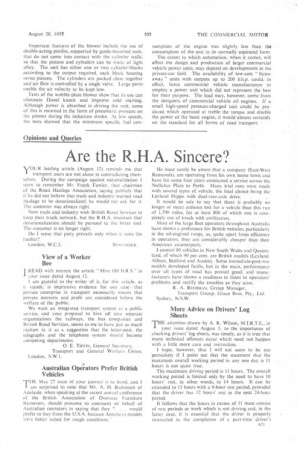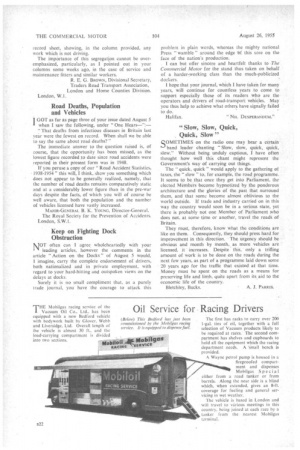Are the R.H.A. Sincere?
Page 55

Page 56

If you've noticed an error in this article please click here to report it so we can fix it.
'OUR leading article (August 12) reminds me that I transport users are not alone in contradicting themselves. During the campaign against nationalization seem to remember Mr. Frank Fowler, then chairman of the Road Haulage Association, saying publicly that if he did not believe that trade and industry wanted road haulage to be denationalized, he would not ask for it. The customer was always right.
Now trade and industry wish British Road Services to keep their trunk network, but the R.H.A. maintain that denationalization should be pursued to the hitter end. The customer is no longer right.
Do I sense that piety prevails only when it suits the haulier?
London, W.C.2. IlYsTANDER.
View of a Worker Bee
I READ with interest the article "Hive Off B.R.S.in i your issue dated August 12.
am grateful to the writer ofit, for this article, as it stands, is impressive evidence for our case—that private enterprise in transport necessarily means that private interests and profit are considered before the welfare of the Public.
We want an integrated transport system as a public service, and your proposal to hive off into separate organizations the railways, the bus companies and British Road Services, seems to me to have just as much realism in it as a suggestion that the letter-post, the telegraphs and the telephone system should become competing departments.
0. E. TIFFIN, General Secretary, Transport and General Workers Union. London, S.W.1.
Australian Operators Prefer British Vehicles
THE May 27 issue of your journal is to hand, and am surprised to note that Mr. A. H. Badenoch of Adelaide, when speaking at the recent annual conference of the British Association of Overseas Furniture Removers, should presume to comment on behalf of Australian operators in saying that they ". . . would prefer to buy from the U.S.A. because American models were better suited for rough conditions. He must surely be aware that a company (East-West Removals), are operating from his own home -town and have for some four years conducted a-service across the Nullabor Plain to Perth. Many trial runs -were made with several types of vehicle, the final. choice: being the Leyland Hippo with dual-rear-axle drive.
It would be safe to'say that there is probably no longer or more arduous test for a vehicle than this run of 1,700 mites, for at least 800 of which one is completely out of touch with civilization.
Most of the large fleet operators throughout Australia have shown a preference for British vehicles;.partieularly in the oil-engined range, as, quite 'apart from.efficiency in operation, they are considerably cheaper than their American counterparts. . I control 80 vehicles in New Sotith Wales and Queensland, of'which 90 per cent. are British models (Leyland; Albion, Bedford and Austin). SOme immediate-post-war models developed faults, but in the main, performance over all types of road has proved good, and manufacturers have shown a readiness to listen to operators' problems and rectify the troubles as they arise. R. A. RUDMAN, Group Manager, ' Transport Group, Grace Bros. Pty., Ltd. Sydney, N.S.W.
More Advice on Drivers Log Sheets
THE attention drawn by A. R. Wilson, M.I.R.T.E., in your issue dated August 5, to the importance of checking drivers' log sheets, was timely, as it is true that many technical offences occur which need not happen with a little more care and instruction.
I hope, however, that I will not seem to be too pernickety if I point out that the statement that the maximum overall working period in any one day is 11 hours is not quite true.
The maximum driving period is 11 hours. The overall working period is limited only by the need to have 10 hours' rest, in other words, to 14 hours. It Can be extended to 15 hours with a 9-hour rest period, provided that the driver has 12 hours' rest in the next 24-hour period.
It follows that the hours in excess of 11 must. consist of rest periods or work which is not driving and, in the latter case, it is essential that the driver is properly instructed in the completion of a part-time driver's record sheet, showing, in the column provided, any work which is not driving.
The importance of this segregation cannot be overemphasized, particularly, as I pointed out in your columns some weeks ago, in the case of service and maintenance fitters and similar workers.
R, E. G. BROWN, Divisional Secretary, Traders Road Transport Association, London and Home Counties Division. London, W.1.
Road Deaths, Population and Vehicles
I GOT as far as page three of your issue dated August 5 when I saw the following, under "One Hears—":— " That deaths from infectious diseases in Britain last year were the fewest on record. When shall we be able to say the same about road deaths?" The immediate answer to the question raised is, of course, that the opportunity has been missed, as the lowest figure recorded to date since road accidents were reported in their present form was in 1948.
If you peruse a copy of our "Road Accident Statistics, 938-l954" this will, I think, show you something which does not appear to be generally realized, namely, that the number of road deaths remains comparatively static and at a considerably lower figure than in the pre-war days despite the facts, of which you will of course be well aware, that both the population and the number of vehicles licensed have vastly increased. MAJOR-GENERAL B. K. YOUNG, Director-General, The Royal Society for the Prevention of Accidents. London, S.W.1.
Keep on Fighting Dock Obstruction
NOT often can I agree. wholeheartedly with your leading articles, however the comments in the article "Action on the Docks" of August 5 would, I imagine, carry the complete endorsement of drivers, both nationalized and in private employment, with regard to your hard-hitting and outspoken views on the delays at docks.
Surely it is no small compliment that, as a purely trade journal, you have the courage to attack this problem in plain words, whereas the mighty national Press " warnble " around the edge 'of this sore on the face of the nation's production.
. I can but offer sincere and heartfelt thanks to The Commercial Motor for the stand thus taken on behalf of a harder-working class than the much-publicized dockers,
hope that your journal, which I have taken for many years, will continue for countless years to come to support especially those of its readers who are the operators and drivers of road-transport vehicles. May you thus help to achieve what others have signally failed to do.
Halifax. "NIL DESPERANDUM."
Slow, Slow, Quick, Quick, Slow"
SOMETIMES on the radio one may hear a certain band leader chanting "Slow, slow, quick, quick, slow." Without being unduly captious, I have often thought how well this chant might represent the Government's way of carrying out things.
. The "quick, quick" would apply to the gathering of taxes, the " slow " to, for example, the road programme. It seems to be that once they get into Parliament, the elected Members -become hypnotized by the ponderous architecture and the glories of the past that surround them, and that some become almost oblivious to the world outside. If trade and industry carried on in this way the country would soon be in a serious state, yet there is probably not one Member of Parliament who does not, at some time or another, travel the roads of Britain.
They must, therefore, know what the conditions are like on them. . Consequently, they should press hard for improvement in this direction. The urgency should be obvious and month by month, as more vehicles are licensed, it increases. Despite this, only a trifling amount of work is to be done on the roads during the next few years, as part of a programme laid down some 20 years ago for the traffic that existed at that time. Money must be spent on the roads as a means for preserving life and limb, quite apart from its aid to the economic life of the country.
Bletchley, Bucks. A. J. PARRIS.




































































































